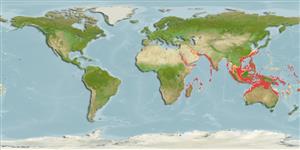>
Eupercaria/misc (Various families in series Eupercaria) >
Lethrinidae (Emperors or scavengers) > Lethrininae
Etymology: Lethrinus: Greek, lethrinia, a fish pertaining to genus Pagellus.
More on author: Valenciennes.
Environment: milieu / climate zone / depth range / distribution range
Ekologi
marina revassocierade; ej vandrande; djupintervall 1 - 150 m (Ref. 4369). Tropical; 30°N - 35°S, 24°E - 173°W
Indo-West Pacific: Red Sea and East Africa to the Ryukyu Islands and New Caledonia. Recently reported from Tonga (Ref. 53797). Also reported from French Polynesian islands (Ref. 4795) but this is a misidentification of Lethrinus rubrioperculatus (Ref. 2295).
Size / Vikt / Age
Maturity: Lm ? range ? - ? cm
Max length : 20.0 cm TL hane/ej könsbestämd; (Ref. 2295); rapporterad maxålder: 15 år (Ref. 2290)
Taggstrålar i ryggfenan (totalt): 10; Mjukstrålar i ryggfenan (totalt): 9; Taggstrålar i analfenan 3; Mjukstrålar i analfenan: 8. Body is brown and gray (usually green, Ref. 48635), becoming lighter ventrally, with scattered irregular dark spots. Often there are two dark bands below the eye, one at the lower rim or the opercle and one at the corner of the mouth. The fins are generally light or translucent; the caudal fin is light and dark striped.
Inhabits sandy and weedy areas near coral reefs, solitarily or in groups (Ref. 30573, 90102), where it is well camouflaged and usually swims in the cover of the substrate (Ref. 48635). Juveniles sometimes abundant in shallow, weedy areas (Ref. 4369). Solitary or in small groups (Ref. 90102). Feeds on small benthic invertebrates (Ref. 30573). A protogynous hermaphrodite (Ref. 55367). Flesh of large individuals is esteemed (Ref. 4369).
Life cycle and mating behavior
Könsmognad | Reproduktion | Lek | Ägg | Fecundity | Larver
A monandric species (Ref. 55367). Length at sex change = 29.1 cm TL (Ref. 55367). Also Ref. 103751.
Carpenter, K.E. and G.R. Allen, 1989. FAO Species Catalogue. Vol. 9. Emperor fishes and large-eye breams of the world (family Lethrinidae). An annotated and illustrated catalogue of lethrinid species known to date. FAO Fish. Synop. 125(9):118 p. Rome: FAO. (Ref. 2295)
IUCN Red List Status (Ref. 130435)
Threat to humans
Harmless
Human uses
Fiskeri: mindre kommeriell
Ytterligare information
referenserVattenbrukVattenbruksprofilAvelslinjerGenetikElectrophoresesÄrftlighetSjukdomarBehandlingNutrientsMass conversion
Verktyg
Special reports
Download XML
Internet-källor
Estimates based on models
Preferred temperature (Ref.
123201): 24.2 - 29, mean 27.9 °C (based on 1950 cells).
Phylogenetic diversity index (Ref.
82804): PD
50 = 0.5000 [Uniqueness, from 0.5 = low to 2.0 = high].
Bayesian length-weight: a=0.01514 (0.00706 - 0.03245), b=2.98 (2.81 - 3.15), in cm total length, based on LWR estimates for this Genus-body shape (Ref.
93245).
Trofisk nivå (Ref.
69278): 3.8 ±0.0 se; based on diet studies.
Generation time: 2.2 ( na - na) years. Estimated as median ln(3)/K based on 1
growth studies.
Resiliens (Ref.
120179): Mellan, lägsta populationsfördubblingstid 1,4-4,4 år (K=0.49; tmax=15).
Fishing Vulnerability (Ref.
59153): Low vulnerability (10 of 100).
Nutrients (Ref.
124155): Calcium = 68.3 [47.0, 105.2] mg/100g; Iron = 0.968 [0.647, 1.427] mg/100g; Protein = 20 [17, 22] %; Omega3 = 0.168 [0.114, 0.243] g/100g; Selenium = 40.8 [25.8, 68.1] μg/100g; VitaminA = 49.5 [10.5, 270.8] μg/100g; Zinc = 2.54 [1.99, 3.27] mg/100g (wet weight); based on
nutrient studies.
